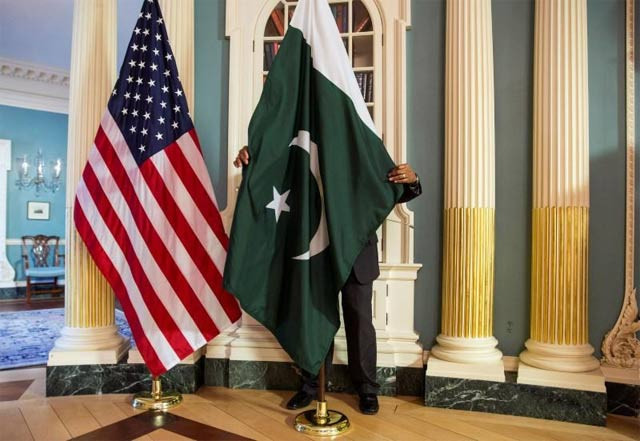Pakistan, US find new grounds for intimacy
Pakistan's swift action on information provided by US intelligence drew instant applause from President Donald...

Pakistan has already launched diplomatic offensive to garner support of key world and regional players. PHOTO: REUTERS
That event suddenly sparked a sense of optimism from both sides. On Wednesday, US Vice President Mike Pence spoke to Prime Minister Shahid Khaqan Abbasi on the phone to thank him on behalf of the US government for the rescue of the couple. Pence also accepted an invitation to visit Pakistan in the near future.
These developments suggest that Pakistan and the US have now found new grounds for relationship building to deal with more pressing challenges presented by terrorism.
Navy SEALs were ready if Pakistan failed to free US-Canadian hostage family: report
The flurry of recent US drone and conventional airstrikes targeting TTP and Haqqani network hideouts close to the Pak-Afghan border are part of the new understanding developed by the two countries to eliminate militant groups on either side of the frontier, judging from the tone of background interactions with security and foreign office officials.
For the last few days, the US and Afghan forces have been pounding militant hideouts in Paktia and Khost regions, considered strongholds of the Haqqani network. TTP also has a strong presence in these Afghan provinces, which border Kurram Agency and North Waziristan.
Umar Khalid Khurasani, the chief of the TTP breakaway faction Jamaatul Ahrar, was reportedly killed in one of the drone strikes in Paktia.
However, there has been no official confirmation about the powerful militant commander’s death.
The elimination of TTP sanctuaries and its leadership on the Afghan side has been one of Pakistan’s major demands.
Officials here said that if news of Khurasani’s death was confirmed, it would be a “significant and positive development” as Pakistan had long called for such decisive action on the other side of the border.
But the US ongoing military operation appeared to be linked to Pakistan’s commitment to take action against groups such as the Haqqani network.
“Pakistan, through its actions, has already proven that it is willing to take on any such group,” said one official referring to the recent successful rescue operation.
The American-Canadian couple had been held hostage by the Haqqani Network since 2012. Pakistan’s action helped restore the confidence of the Trump administration that Islamabad could be partnered with to stabilise Afghanistan, according to diplomatic sources.
It was because of this newfound cooperation between the two sides that Pakistan publicly supported the ongoing US and Afghan forces’ military campaign in Paktia and Khost.
The army said the US shared information with Pakistan before launching the operation. Officials said both sides have been in contact and Pakistan was providing crucial intelligence to the US to locate high-value targets on the other side of the border.
Despite some reports that drones hit the Pakistani side, Inter-Services Public Relations (ISPR) dismissed such reports, saying the drones strikes were in Afghanistan and Pakistani airspace was never violated.
In phone call to Abbasi, Pence praises Pakistan for rescuing US-Canadian family
The lack of access for independent media and the porous nature of the Pak-Afghan border in Kurram Agency made it difficult to verify where exactly the drones struck. But Pakistan’s decision to support the action suggests that both countries were on the same page.
The army went as far as tying the ongoing Resolution Support Mission operation with the recent visit of army chief General Qamar Javed Bajwa to Afghanistan.
When asked whether the ongoing operation was part of the new understanding between the US and Pakistan, a senior military official referred to the statement issued by the ISPR on Tuesday in which Pakistan clearly backed the current offensive.
The official said Pakistan had been pushing for coordinated operations on both sides of the border, which “is finally happening now”. He said that while US and Afghan Forces were conducting operations on their side of the border, Pakistan security forces were remaining vigilant to ensure none of their targets can sneak into Pakistan.



















COMMENTS
Comments are moderated and generally will be posted if they are on-topic and not abusive.
For more information, please see our Comments FAQ